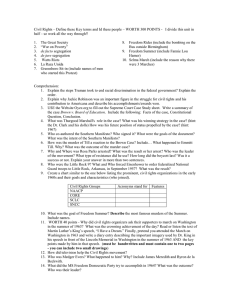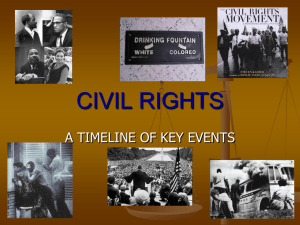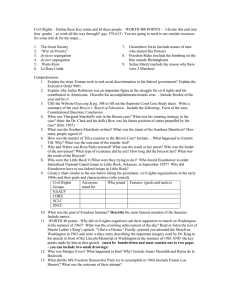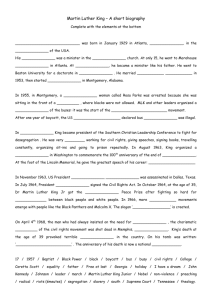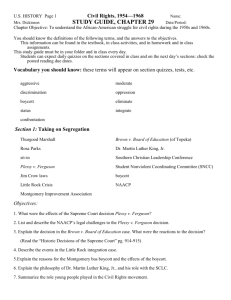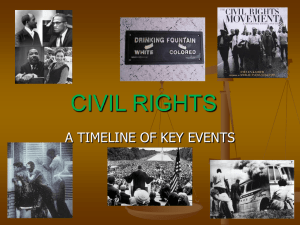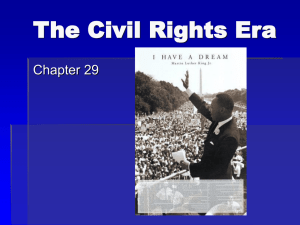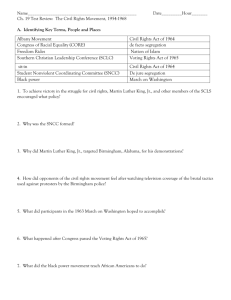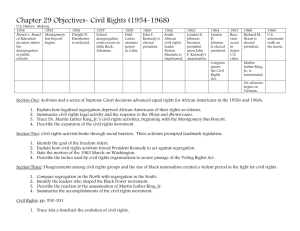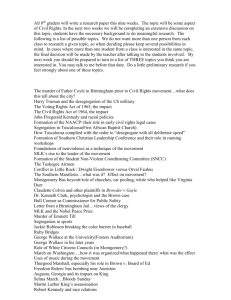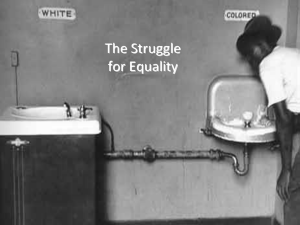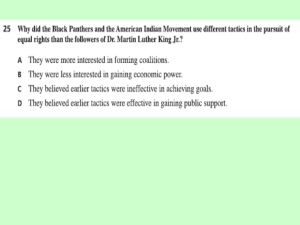Review: Civil Rights Movement - Sewanhaka Central High School
advertisement
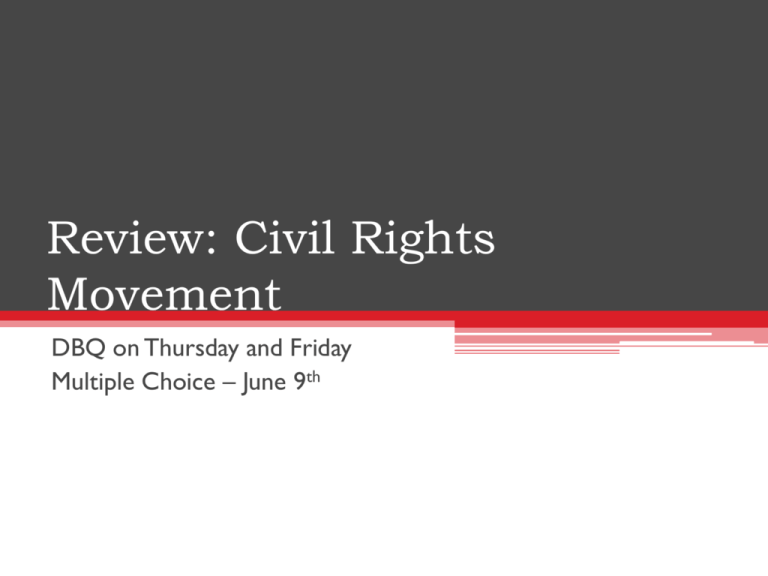
Review: Civil Rights Movement DBQ on Thursday and Friday Multiple Choice – June 9th CIVIL WAR Amendments • 13th: 1865 abolished slavery • 14th: 1868 established citizenship and due process 15th: 1870 universal male suffrage Plessy v. Ferguson • 1896 US Supreme Court legalizes segregation in the United States “SEPARATE BUT EQUAL” Civil Rights Movement • Plessy v. Ferguson 1896- established the principle “separate but equal.” Allowed for segregation. • Brown v. Board of Ed. 1954 reversed this decision and desegregated public schools. Early Civil Rights Leaders • W.E.B. DuBois—pushed for immediate civil rights and equality. Leader of NAACP(1909) • Booker T. Washington founder of Tuskegee Institute. • Atlanta Compromise Speech 1895 1909 NAACP National Association for the Advancement of Colored People established 1954 Brown v. Board of Education of Topeka, Kansas Supreme Court rules “separate educational facilities are inherently unequal”. Ends school segregation. Martin Luther King Jr. • Influenced by Gandhi • Passive Resistance – do not hit back • Civil Disobedience – break a law if you do not agree with it (but accept the consequences). Montgomery Bus Boycott • 1955-1956 • Rosa Parks refused to give up her seat on the bus • Year long boycott that desegregated the buses. 1955 Montgomery Bus Boycott • Rosa Parks arrested for refusing to move to the back of the bus. A boycott follows, leading to desegregation. 1957 Central High School Little Rock, Arkansas “The Little Rock Nine” • Pres. Eisenhower sends federal troops after Arkansas governor Orval Faubus uses the National Guard to deny entrance to African-American students at Central High. 1960 Sit-ins • College students in Greensboro, NC stage sit-ins at the Woolworth’s lunch counter 1961 Freedom Rides • Volunteers, black and white, take buses into the South to test new desegregation laws, often meeting with violence. Meant to increase pressure on the South for equal rights. Freedom rides 1962 Univ. of Mississippi • Pres. Kennedy sends 5000 federal troops to Mississippi to allow James Meredith, the school’s 1st African-American student, to attend. 1963 Birmingham, AL • Martin Luther King and the SCLC (Southern Christian Leadership Conference) focus on segregation in Birmingham. Protests there end in violence, riots, and arrests of adults and children. • King was jailed – wrote “Letter from a Birmingham Jail” which he defended his methods. Medgar Evers • A field secretary of the NAACP – working to desegregate Jackson, Mississippi • June 1963 he was murdered by a sniper outside of his home. 1963 Bombing in Birmingham • 16th St. Baptist Church, a bomb explodes on a Sunday morning, killing four young girls. • KKK member seen planting bomb, is arrested, but found guilty of possessing dynamite without a permit. Fined $100 and six months in jail. Aug 1963 March on Washington • 200,000 people hear Martin Luther King’s “I Have a Dream” speech in Washington. 1964 24th Amendment • Outlawed poll tax. Black voter registration begins to increase. Civil Rights Act 1964 • No discrimination based on race or color • Equal access to libraries, parks, schools, etc. • Equal Employment Opportunity Commission 1964 Mississippi Freedom Summer • Civil rights activists attempt to register AfricanAmericans to vote 1965 Selma March • Demanding voting rights, 600 protesters plan to march to Montgomery. • 6 blocks into march, they meet state troopers armed with nightsticks and tear gas. SELMA, ALABAMA 1965 1965 Voting Rights Act • After the events in Selma, Pres. Johnson calls for passage of a voting rights bill. • Outlaws literacy tests, established federal oversight Protests—different views • KING: Non-violent, passive resistance • Influenced by Ghandi • Black Power: proactive, militant, focus on black pride and African heritage. Black Power Movement • African Americans should take control of the political and economic aspects of their lives. Some advocated the use of violence. • Malcolm X – promoted black nationalism. Originally a member of The Nation of Islam, then breaks away and forms Muslim Mosque, Inc. 1968 Martin Luther King, Jr assassinated • Memphis, TN, King is shot by James Earl Ray. He was 39 years old.
